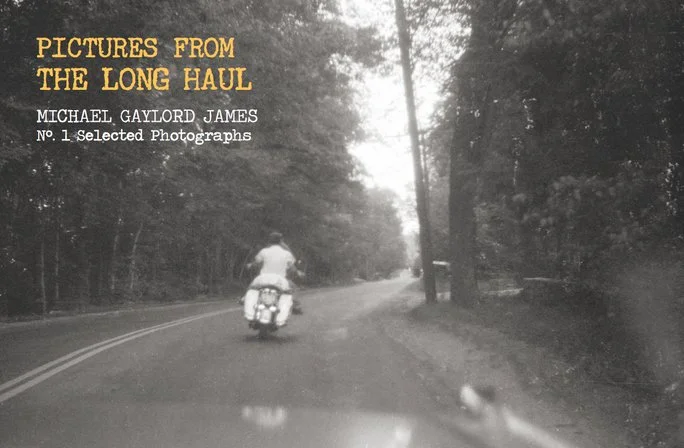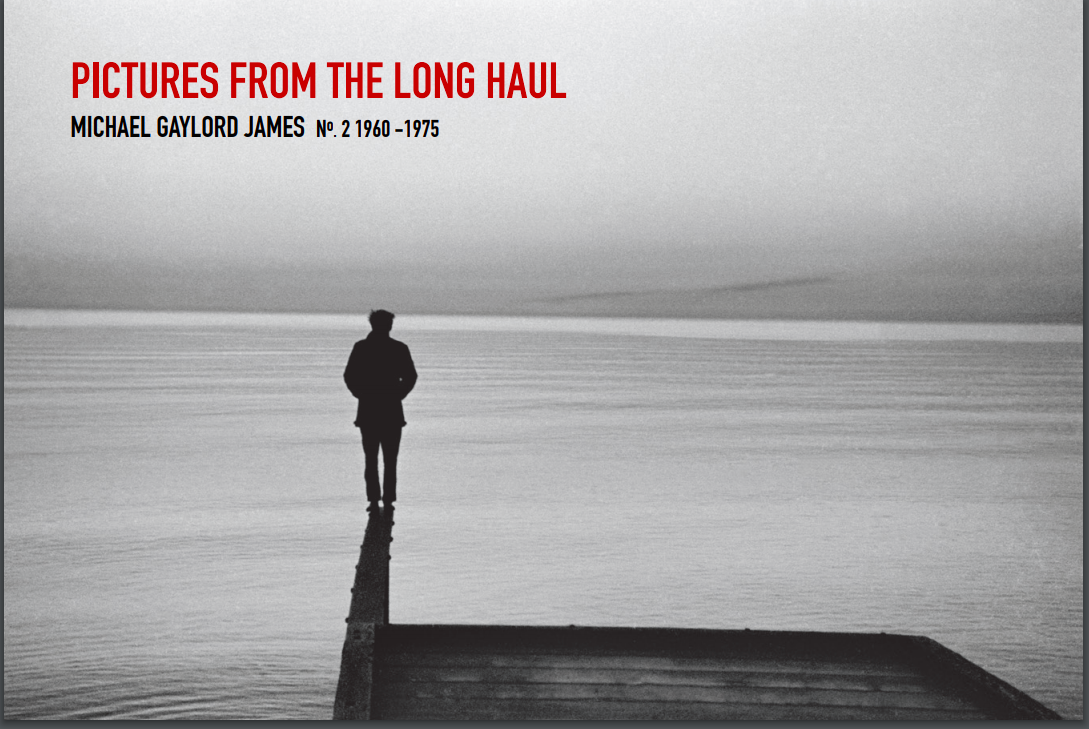A Chicagoan's "Love Affair with Life": The Photography of Michael Gaylord James
Michael Gaylord James | Pictures from the Long Haul: Selected Photographs and Volume Two, Pictures from the Long Haul, Selected Photographs, 1960-1975 | Prairie Dancer Press | Chicago | 2019 | $25 each | Postpaid, 1509 W. Lunt, Chicago IL 60626
Michael James is a Midwest legend. A larger-than-life figure who was swept into the radical movements of the early 1960s, James led one of the few successful community-organizing projects among the impoverished, ran a notable restaurant, acted in films and still has a local radio show. All the while, he traveled widely, often on a motorcycle, and when back home in Chicago, he acted the part of the affable bohemian. He was also, for quite a few years, quite handsome—one of those large fellows with remarkable poise and it would be easy to say that he seems to be endlessly on stage.
He has published few books, probably he had no time to publish much in that form, although a community newspaper of the 1970s, Rising Up Angry, may have been enough for a lifetime. (It was followed by a more low-key paper, Heartland Journal, 1979-2005.) Herewith, James begins to offer up chunks of the settings he has captured with a camera over a span of more than fifty years, the visual memories of rambling around, with pals or alone.
The earliest shot in the first volume, Pictures from the Long Haul: Selected Photographs, captured a man standing on a pier jutting out into the lake. It was taken in 1961 when James was a freshman at Lake Forest College. He had come there from his parents' home in Westport, Conn., but his father was from Chicago and James says he can still remember his first visit, as a child, to his grandparents' home in South Shore. He also remembers coming back at age 14, staying with his dad at a downtown hotel and making a trip to a Rush Street store to purchase a pair of blue jeans he had seen advertised in a men's magazine.
James would make his home here after college, and become, pretty soon, an influential figure in the city, specifically the poorer neighborhoods. Bolstered by his size, no doubt, he could place himself in difficult circumstances, fielding threats from either side of the law, without showing fear. He radiated respect for himself, his Chicago, his ideals.
In the late 1960s, he founded Rising Up Angry (RUA), which gave the tabloid its name but was also very much a socio-political force for white, working-class folks who themselves organized residents of Lakeview and Uptown. In the next few years, its influence spread, especially among the youth, widely to other impoverished, racially inclusive sections of town and as far as Waukegan, in Lake County to the North. RUA offered free or low-cost legal and health services, staged events and worked alongside outfits like the Black Panthers and Young Lords to fight against racism and injustice and for fair housing.
Rising Up Angry was designed to "educate to liberate" and build a radical community organization. Michael James, "Educate to Liberate,” 1974.
In its day, RUA was hugely admired—and thoroughly despised by the political establishment—because it brought together recent arrivals from the South, “hillbillies” and African Americans, as few other organizations could do. It came out of the community organizing project of Students for a Democratic Society (SDS) called Jobs or Income Now (JOIN) but outlived its counterparts. None of the other urban projects launched by SDSers, around the country, were so successful—indeed, most fell flat after a couple of years. James would disclaim the power of the personality, but there is no doubt that this organization owed a lot to his persona.
The organization lasted until 1975, by which time James was on to the next thing, co-founding with his ex-wife, Stormy Brown, and Katy Hogan the venerable and beloved Heartland Cafe in Rogers Park, with its charming slogan “Good Wholesome Food for the Mind and Body.” He also acted in a small flock of films, playing cameo roles in “Stony Island” and “The Fugitive” among others.
“I never really thought of myself as a photographer, though I have been taking pictures since I got my first Brownie camera as a kid,” James told an interviewer at a gallery show in 2014. It was, instead, “a way for me to document things as I went along.” He says in the introduction to the first volume here, they are “evidence of my continuing love affair with life,” a most Jamesian phrase to be taken almost literally.
The cover of James’ second collection, Pictures from the Long Haul, Selected Photographs, 1960-1975.
The actual photographs offer glimpses of a ramble that feels like a Beat successor on the road, including one of the motorcycles, a Triumph EXN13. We see African American kids at play or just walking around, small-town daily life, a boy on a horse in the Menominee Reservation of Wisconsin, a minor league baseball game in Danville, Illinois, a weathered library in Coin, Iowa (where his great grandparents had lived), and lots more from 1961 to the present.
The second volume’s shots, dated from 1960 to 1975, recall his early semi-career of commercial photo shoots of car shows and drag strips around New England. In these shots, we see James travel back and forth from Lake Forest College to the Free Speech Movement in Berkeley, on to Mexico on his motorcycle, and back to Uptown. Among the high points are surely the Uptown days, serious organizing (the radical third party run for the presidency in 1968 with local Peggy Terry as the vice-presidential candidate), greasers hanging out drinking, locals reading Rising Up Angry, and a Western adventure as RUA closed and the restaurant business was about to open.
The subjects are various, but behind the subject is always another subject, the photographer himself. This is his story, as well as if he wrote it in prose. It’s not continuous or filled in, but it’s definitely his. We are simply invited in to contemplate it.
Copies are available through Michael James and Prairie Dancer Press. You can contact him at 1509 W. Lunt, Chicago, IL 60626 or michaelgaylordjames@gmail.com. Additionally, you can access many of James’ photos on his website, michaelgaylordjames.com.



